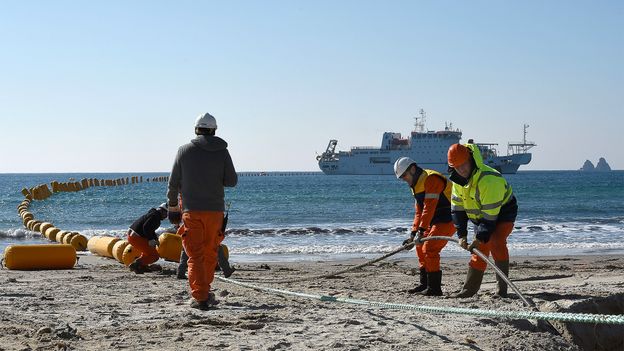(The idea that cables break because sharks bite through them is now a bit of an urban legend, adds Clare. “There were instances of sharks damaging cables, but that’s long gone because the cable industry uses a layer of Kevlar to strengthen them.”)
Cables have to be kept thin and light in deeper waters, though, to aid with recovery and repair. Hauling a large, heavy cable up from thousands of metres below sea level would put a huge amount of strain on it. It’s the cables nearer the shoreline that tend to be better armoured because they are more likely to be snagged by nets and anchors.
An army of stand-by repair ships
If a fault is found, a repair ship is dispatched. “All these vessels are strategically placed around the world to be 10-12 days from base to port,” says Mick McGovern, deputy vice-president for marine operations at Alcatel Submarine Networks. “You have that time to work out where the fault is, load the cables [and the] repeater bodies” – which increase the strength of a signal as it travels along the cables. “In essence when you think how big the system is, it’s not long to wait,” he says.
While it took nine months to repair the last of the subsea cable damage caused by the 1929 Newfoundland earthquake, McGovern says a modern deep-water repair should take a week or two depending on the location and the weather. “When you think about the water depth and where it is, that’s not a bad solution.”
That does not mean an entire country’s internet is then down for a week. Many nations have more cables and more bandwidth within those cables than the minimum required amount, so that if some are damaged, the others can pick up the slack. This is called redundancy in the system. Because of this redundancy, most of us would never notice if one subsea cable was damaged – perhaps this article would take a second or two longer to load than normal. In extreme events, it can be the only thing keeping a country online. The 2006 magnitude 7 earthquake off the coast of Taiwan, severed dozens of cables in the South China Sea – but a handful remained online.

